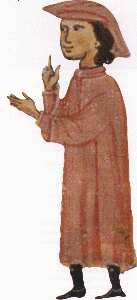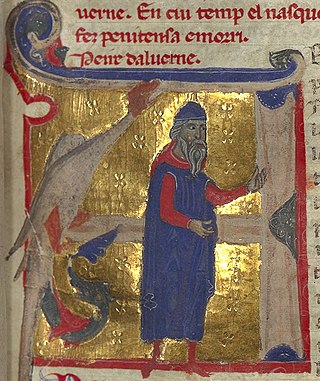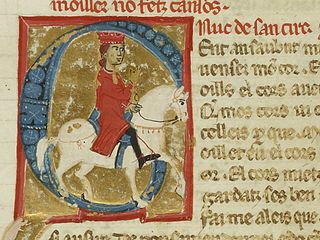
Aimeric or Aimery de Peguilhan, Peguillan, or Pégulhan was a troubadour born in Peguilhan, the son of a cloth merchant.

Rigaut de Berbezilh was a troubadour of the petty nobility of Saintonge. He was a great influence on the Sicilian School and is quoted in the Roman de la Rose. About fifteen of his poems survive, including one planh and nine or ten cansos. His name is sometimes given as Richart or Richartz.

Marcabru is one of the earliest troubadours whose poems are known. There is no certain information about him; the two vidas attached to his poems tell different stories, and both are evidently built on hints in the poems; not on independent information.
Bernart Marti was a troubadour, composing poems and satires in Occitan, in the mid-twelfth century. They show that he was influenced by his contemporaries Marcabru and knew Peire d'Alvernha, who, in one poem, he accused of abandoning holy orders. Along with Peire, Gavaudan and Bernart de Venzac he is sometimes placed in a hypothetical Marcabrunian school. His work is "enigmatic, ironic, and satiric", but has no following among later troubadours, according to Gaunt and Kay.
Marcoat was a minor Gascon troubadour and joglar who flourished in the mid twelfth century. He is often cited in connexion with Eleanor of Aquitaine and is placed in a hypothetical "school" of poetry which includes Bernart de Ventadorn, Marcabru, Cercamon, Jaufre Rudel, Peire Rogier, and Peire de Valeria among others. Of all his works, only two sirventes survive: Mentre m'obri eis huisel and Una re.us dirai, en Serra.

Peire d'Alvernhe or d'Alvernha was an Auvergnat troubadour with twenty-one or twenty-four surviving works. He composed in an "esoteric" and "formally complex" style known as the trobar clus. He stands out as the earliest troubadour mentioned by name in Dante's Divine Comedy.

Uc de Saint Circ or Hugues (Hugh) de Saint Circq was a troubadour from Quercy. Uc is perhaps most significant to modern historians as the probable author of several vidas and razos of other troubadours, though only one of Bernart de Ventadorn exists under his name. Forty-four of his songs, including fifteen cansos and only three canso melodies, have survived, along with a didactic manual entitled Ensenhamen d'onor. According to William E. Burgwinkle, as "poet, biographer, literary historian, and mythographer, Uc must be accorded his rightful place as the 'inventor' (trobador) of 'troubadour poetry' and the idealogical trappings with which it came to be associated."
A cobla esparsa in Old Occitan is the name used for a single-stanza poem in troubadour poetry. They constitute about 15% of the troubadour output, and they are the dominant form among late authors like Bertran Carbonel and Guillem de l'Olivier. The term cobla triada is used by modern scholars to indicate a cobla taken from a longer poem and let stand on its own, but its original medieval meaning was a cobla esparsa taken from a larger collection of such poems, since coblas esparsas were usually presented in large groupings.

Bertran d'Alamanon, also spelled de Lamanon or d'Alamano, was a Provençal knight and troubadour, and an official, diplomat, and ambassador of the court of the Count of Provence. Twenty-two of his works survive, mainly provocative tensos and sirventes, many dealing with Crusading themes.

Giraut or Guiraut de Calanso or Calanson was a Gascon troubadour in the Occitan language. Of his lyric works that remain five are cansos, two descorts, a congé, a planh, and a vers. He also wrote a mock ensenhamen entitled Fadet juglar.

Elias de Barjols was a bourgeois Aquitainian troubadour who established himself in Provence and retired a monk. Eleven of his lyrics survive, but none of his music.

In Old Occitan literature, a tornada refers to a final, shorter stanza that appears in lyric poetry and serves a variety of purposes within several poetic forms. The word tornada derives from the Old Occitan in which it is the feminine form of tornat, a past participle of the verb tornar. It is derived from the Latin verb tornare.
UcCatola was a knight and early troubadour, possibly a participant in the Second Crusade and perhaps later a monk.
Alegret was a Gascon troubadour, one of the earliest lyric satirists in the Occitan tongue, and a contemporary of Marcabru. Only one sirventes and one canso survive of his poems. Nonetheless, his reputation was high enough that he found his way into the poetry of Bernart de Ventadorn and Raimbaut d'Aurenga. The work of Alegret is also intertextually and stylistically related to that of Peire d'Alvernhe.

Bernart de Venzac was an obscure troubadour from Venzac near Rodez in the Rouergue. He wrote in the Marcabrunian style, leaving behind five moralising pieces and one religious alba. Two of his works were confused by copyists with those of Marcabru in some manuscripts.

Cerverí de Girona was a Catalan troubadour born Guillem de Cervera in Girona. He was the most prolific troubadour, leaving behind some 114 lyric poems among other works, including an ensenhamen of proverbs for his son, totaling about 130. He was a court poet to James the Conqueror and Peter the Great. He wrote pastorelas and sirventes and his overriding concern was the complexities of court life. None of his music survives.
Gavaudan was a troubadour and hired soldier at the courts of both Raymond V and Raymond VI of Toulouse and later on in Castile. He was from Gévaudan, as his name implies. He wrote moralising lyrics, either religious or political, and ten of his works survive, including five sirventes, two pastorelas, one canso, one planh for an anonymous domna (lady), and one Crusade song. He is sometimes clumped in a primitive Marcabrunian "school" of poetry alongside Bernart Marti, Bernart de Venzac, and Peire d'Alvernhe. He developed a hermetic style, combining elements of the trobar ric and trobar clus.

Elias (de) Fonsalada was a troubadour from Bergerac in the Périgord. Only two cansos of his survive.
A gab or gap is a troubadour boasting song. It is often considered related to the tenso and partimen, two types of debate poem. Sometimes the gab is not considered a separate genre of poetry but simply a boast found within another genre, commonly the sirventes.
Simon Gaunt was a professor of French literature at King's College London, where he was Head of the French Department and Head of the School of Humanities. He was past president of the Society for French Studies (2006-8), a Fellow of King's College, London from 2015 and an Honorary Fellow of St. Catharine's College, Cambridge from 2016.












